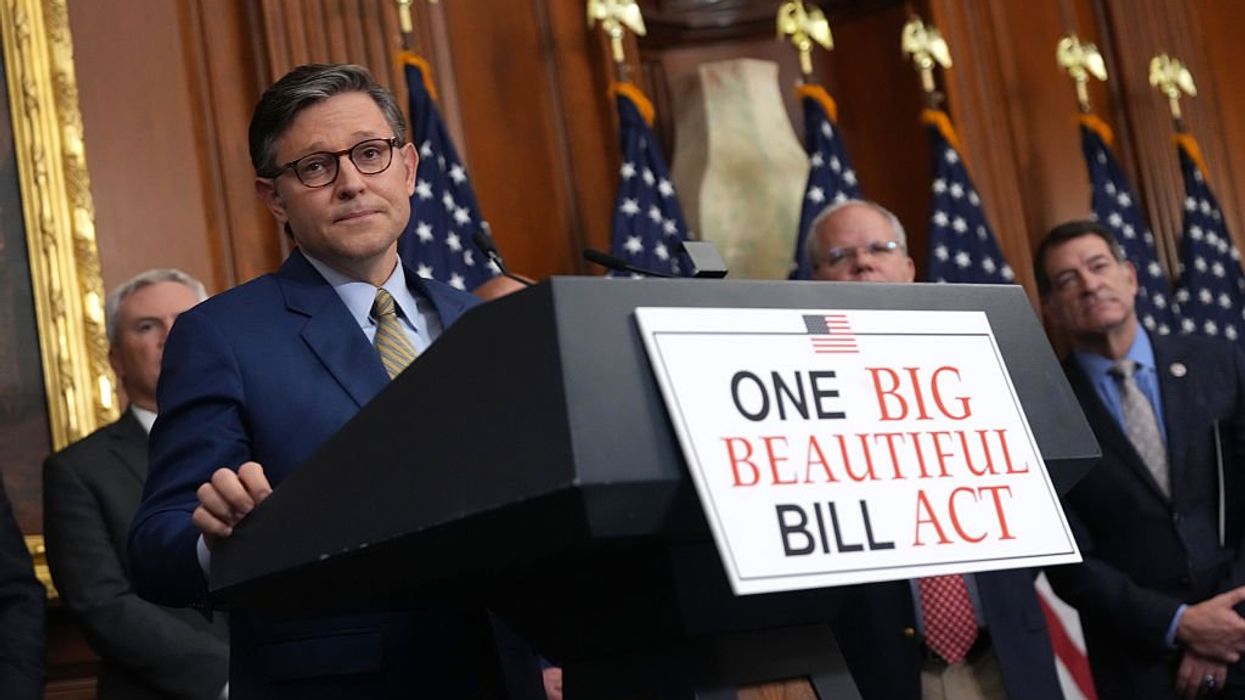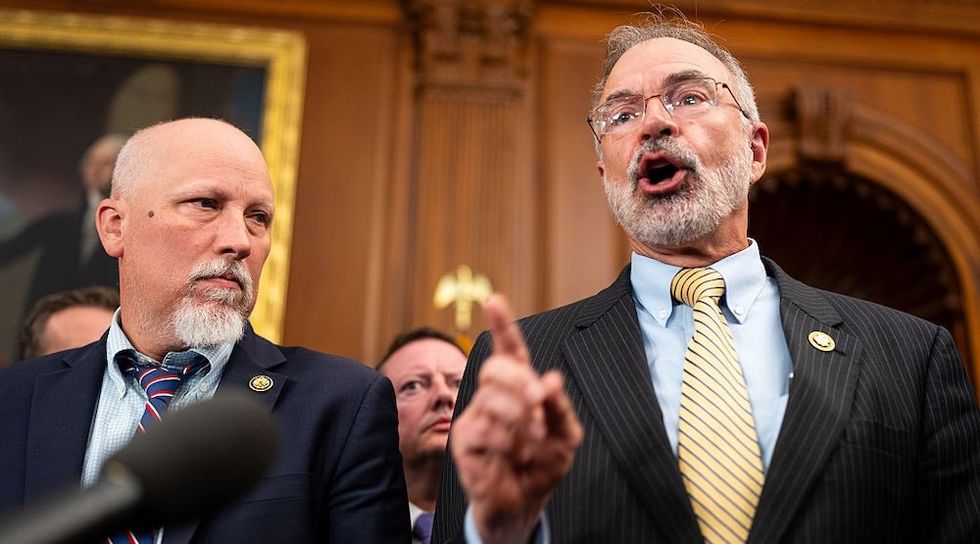
Photo by Kevin Dietsch/Getty Images

The GOP’s landmark budget bill bans states from regulating AI or mRNA drugs while handing globalist-backed carbon pipelines unchecked power to seize private land. So much for America First.
The Republicans’ bizarrely named “Big Beautiful Bill Act” includes two egregious provisions that would strip states of their power to regulate key agenda items pushed by globalist elites.
Anyone who still understands what the word “conservative” means can see the truth: The Republican budget bill is a mixed bag of deficit bloat, missed opportunities, and the odd policy win. Whether the House bill was worth passing as a “take it or leave it” deal depends on one’s political calculus. But the result is underwhelming and fails to rise to the moment.
Stripping states of authority and subsidizing green fantasies are the exact opposite of the anti-globalist message that won Trump the White House.
Supporters of the bill — particularly President Trump and House Speaker Mike Johnson (R-La.) — argue that it’s the best possible outcome given a razor-thin House majority packed with RINOs from purple districts in blue states. Set aside that debate. If it’s true, then conservatives should focus their energies in deep-red states where Republicans hold supermajorities. That’s where we can — and must — do the work Congress won’t.
Instead, Republican leaders included two provisions in the bill that actively prevent red states from pushing back against green energy mandates, land-grabs, surveillance schemes, and a growing transhumanist agenda.
Thanks to Republican Freedom Caucus stalwarts, including Reps. Andy Harris of Maryland and Chip Roy of Texas, much of the Green New Deal faces rollback — assuming, of course, the Senate doesn’t block the repeal. But one key subsidy survives: federal incentives for carbon capture pipelines. Worse still, the bill strengthens protections for these projects by stripping states of regulatory power.
Section 41006 spells it out: “Notwithstanding any other provision of law,” once the Federal Energy Regulatory Commission grants a pipeline license under an newly amended section of the Natural Gas Act, state and local governments can no longer block or delay the project using zoning, permitting, or land-use laws.
In plain English: carbon dioxide pipelines, backed by federal subsidies, get the same privileges as oil and gas pipelines. That includes eminent domain powers and “certificate of public convenience and necessity” status — bureaucratic code for “we’ll take your land whether you like it or not.”
But carbon pipelines aren’t oil and gas. Oil fuels the economy and delivers a clear public good. Carbon capture, by contrast, sucks up CO2 and buries it to appease climate hysterics. It serves no market need and survives only through government handouts. It exists to sanctify the fiction that carbon dioxide is a pollutant.
This isn’t an oversight. It’s a direct response to South Dakota ranchers, who successfully fought to ban eminent domain for carbon capture projects. Lawmakers in Iowa and North Dakota have followed suit, targeting Summit Carbon Solutions’ proposed pipeline, which would have plowed through private ranchland to serve a project with no public value.
The rebellion in South Dakota ranks among the most important conservative grassroots victories in recent history. Yet this bill spits in the face of those landowners. It overrides red-state laws and rural rights on behalf of globalist, green-energy profiteers.
Funny how Republicans said budget reconciliation couldn’t include policy changes. That was the excuse for not pursuing immigration reform or judicial restructuring. And yet when it suits the priorities of Big Tech and globalist interests, lawmakers found a way to insert sweeping federal mandates into the bill.
Out of nowhere, either the White House or GOP lawmakers added a provision banning states from regulating artificial intelligence or data center systems. Section 43201 of the bill states: “No State or political subdivision thereof may enforce any law or regulation regulating artificial intelligence models, artificial intelligence systems, or automated decision systems during the 10-year period beginning on the date of the enactment of this Act.”
That’s not compromise. That’s total pre-emption — no exceptions.
Florida and other red states have already passed laws prohibiting the use of AI in enforcing gun control or violating medical privacy. More states are following suit. Legislatures across the country are debating how to safeguard civil liberties and property rights from tech overreach. But this bill would kneecap every one of those efforts.
Then come the AI data centers — massive, power-hungry, water-consuming facilities that are cropping up in rural areas and harming communities in their wake. Bipartisan state efforts aim to regulate them through zoning and environmental protections. Yet under this bill, Congress could override even the most basic local safeguards. If a township tries to limit where these centers operate or how they’re built, that could be viewed as “regulating AI systems” and thus outlawed for a decade.
Why does this matter? Because tech moguls aren’t hiding their intentions.
RELATED: The Republicans who could derail reconciliation

At Trump’s January 22 launch event for Oracle’s Stargate platform, CEO Larry Ellison gushed about mRNA vaccines. “One of the most exciting things we’re working on ... is our cancer vaccine,” he said. “Using AI, we can detect cancers through blood tests and produce an mRNA vaccine robotically in about 48 hours.” That’s the model. AI plus big data plus biotech equals unregulated medical experimentation — powered by infrastructure no local government can block.
Red states have started pushing back, attempting to pass 10-year moratoriums on mRNA technology. But the federal budget bill would do the opposite: It could impose a 10-year federal moratorium on state bans.
So here’s the question: Do we really want Arab-funded special interests building AI spying centers in our heartland with no recourse for state and local governments to regulate, restrict, or place common-sense privacy guardrails on these new Towers of Babel?
That question raises another: Should localities be forced to accept carbon pipelines by federal decree, with no power to defend their land or water?
These policies — stripping states of authority, empowering transnational corporations, subsidizing green and biotech fantasies — are the exact opposite of the anti-globalist, America First message that won Trump the White House and won Republicans the House.
We deserve answers. Who inserted these provisions? And more urgently, who will take them out?
Daniel Horowitz
Blaze Podcast Host